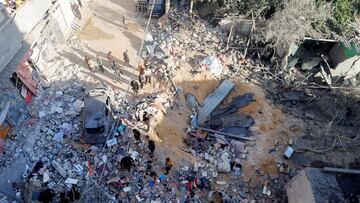WORLD
Biden says pausing arm shipment to Israel, what are the reasons?
US policy has shifted with weapons shipments paused while the Israeli army gears up for an assault on Rafah, home to 1.5 million people.

The city of Rafah in Gaza has been at the centre of a yet another Palestinian crisis, with the Israeli military poised to launch a major operation that is expected to result in extensive civilian casualties. More than 1.5 million people are taking refuge in the tiny corner the size of 400 football fields.
The situation is leading to a significant shift in US policy, with President Joe Biden announcing that the US would halt a shipment of weapons to Israel, citing concerns over the potential use of these arms in the densely populated city.
When asked if Israel had crossed a “red line”, the US president replied “not yet”.
This move marks a departure from the traditional robust support the US has provided to Israel, as the Biden administration seeks to cover growing discontent at home over the administration’s policy toward the invasion of Gaza. 35,000 Palestinians have been killed over the last eight months, at least two-thirds of which are women and children.
The situation in Rafah
Rafah is considered Hamas’s last major stronghold in the region. The city has been the focus of intense Israeli military operations, with airstrikes and the deployment of tanks into the area.
The escalation has been met with warnings from the Biden administration, which has urged Israel to avoid a major ground operation in Rafah, citing the potential for extensive civilian casualties. The situation has been further complicated by the evacuation of 110,000 civilians from the city and intensified airstrikes on its border areas, which have been seen as ominous indicators of a possible escalation.
Biden’s decision to halt arms shipments
In response to the growing tensions, the US government intervened in an arms shipment destined for Israel. The shipment consists of 1,800 2,000-pound (900-kilogram) bombs and 1,700 500-pound (225-kilogram) bombs. This decision marks the first instance of Biden utilising his power to restrict arms exports as a means to influence Israel’s military strategy since the Hamas-led attack on 7 October.
“Our leverage is clear,” Sen. Bernie Sanders said. “Over the years, the United States has provided tens of billions of dollars in military aid to Israel. We can no longer be complicit in Netanyahu’s horrific war against the Palestinian people.”
Despite the recent apparent shift in policy, the Biden administration has consistently emphasised its commitment to supporting Israel. The US has historically provided enormous amounts of military aid to Israel, which has only accelerated in the aftermath of 7 October. Billions of dollars are sent every year to the US ally, with much of the Israeli firepower used this year US designed.
It is not just support through weaponry, the US has given Israel crucial shielding on the international stage. It has consistently vetoed United Nations’ resolutions to end the fighting, the only nation to do so. As long as Israel can count upon tacit US support for its invasion then it is protected from repercussions.






